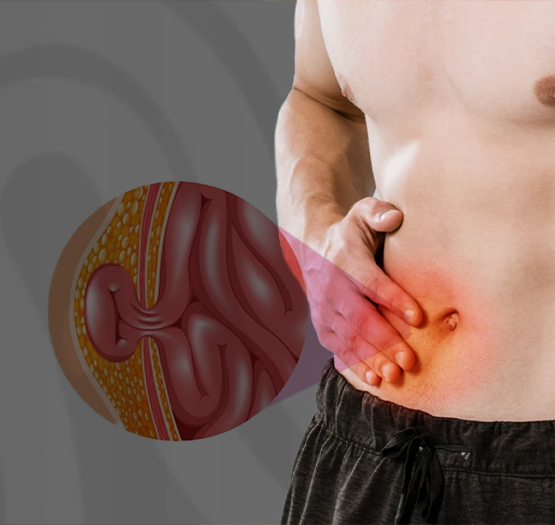Inguinal hernia surgery in Pakistan
Repair, Restore, and Relieve Get Back to Life Pain-Free!
Get Expert Inguinal Hernia Repair With Dr. Tahir Yunus, An American-Certified Surgeon
- Thorough Pre-Surgery Evaluation
- Personalised Treatment Strategy
- Minimally Invasive Surgical Technique
- Ongoing Medical Monitoring & Support
- Comprehensive Aftercare & Recovery Plan
What is Inguinal Hernia?
The word “inguinal” refers to a specific area in your lower abdomen, near the groin. That’s where this hernia occurs. To picture it, think about the area where your belly meets your thigh, on both sides. This is where your inguinal canals are located.
Your abdomen contains important organs like the stomach, liver, intestines, etc. It’s like a strong, flexible container that keeps everything in place. Its walls are made up of muscles and tissues, and they work together to keep your organs safe.
So, What Goes Wrong is that,
Sometimes, due to factors like age, genetics, or even lifting heavy things, the walls of your abdomen can become weak in certain spots, especially around the inguinal canals. When this happens, a small part of your intestine or fatty tissue can slip through these weak spots and form a bulge. This bulge is the hernia. Laparoscopic groin or inguinal hernia repair is known as the most effective solution for treating this and closing the weak spot in the abdomen.
Laparoscopic Repair
Laparoscopic groin or inguinal hernia repair is the standard surgical procedure for the treatment of inguinal hernia. It is a minimally invasive technique that involves making small cuts through which a camera and specialized instruments are inserted. During the surgery, the hernia is pushed back into the abdomen, and a synthetic mesh is placed over the weakened area of the abdominal wall to provide reinforcement. The mesh used in laparoscopic repair is often designed to be more flexible and lightweight and is typically made of materials that promote tissue ingrowth and integration, helping the body’s tissues grow into and around the mesh over time. The mesh becomes part of the body, giving strength and support to the abdominal muscles. Similar to gastric sleeve surgery in Pakistan, this laparoscopic approach ensures faster recovery, reduced pain, and a lower risk of complications compared to open surgery.
Laparoscopic groin or inguinal hernia repair offers benefits such as reduced pain, lower risk of infection, faster recovery, and smaller scars compared to traditional open surgery.
This procedure is often preferred for its minimally invasive nature and its ability to address inguinal hernias while minimizing discomfort and recovery time for the patient. However, not everyone is a suitable candidate for laparoscopic repair due to their medical history, making open repair the only option in such cases. For those seeking Abdominal Hernia Surgery in Pakistan, both laparoscopic and open techniques are available, and the choice depends on the patient's condition and the surgeon’s recommendation.
Open Repair
During the procedure, a large incision is made directly over the hernia site, and the hernia is carefully pushed back into the abdomen. The surrounding tissues are stretched to bring them closer, however, it can create some tension in the area. A synthetic mesh patch is placed over the weakened area of the abdominal wall to provide support. Because the mesh is placed outside the abdominal wall, it doesn’t need to be as flexible as the mesh used in laparoscopic repair, in fact it is more rigid and heavyweight. The incisions are then closed. This traditional procedure has a recurrence rate of around 70%.
While open inguinal hernia repair might result in a slightly larger scar compared to laparoscopic groin or inguinal hernia repair, it remains an effective approach that has been used for many years. It might be recommended based on factors like the patient’s medical history and the size of the hernia. Although the recovery period after open repair can be slightly longer than with laparoscopic repair, the procedure is generally well tolerated and offers successful outcomes in treating inguinal hernias.

Benefits of Inguinal Hernia Surgery
We at ALSA Pakistan are dedicated to prioritizing your well-being and comfort. Our advanced laparoscopic hernia surgery involves the least cuts. Plus, it brings numerous benefits. Some are here
- 1Patients experience a lot of relief from pain due to hernia. It ultimately improves their quality of life.
- 2It is one of the minimally invasive techniques that cause less discomfort.
- 3Timely treatment of hernia helps prevent complications such as trapped hernia or blockage in bowel movement.
- 4Inguinal hernia treatment guarantees that hernia will not increase in size. It can cause severe pain.
- 5Patients experience a considerable improvement in mobility due to the elimination of symptoms.
- 6Small incisions shorten your recovery time, allowing you to resume your daily activities soon.
- 7The treatment repairs the intestine and hence makes your digestive system better.
- 8Relief in pain and discomfort enables you to participate in physical activities such as exercises.
- 9If you ignore your hernia, it can create a need for emergency surgery due to related complications.
- 10All the health benefits associated with treatment guarantee long-term health protection.
Why Choose ALSA Pakistan for Inguinal Hernia Surgery?
ALSA Pakistan is publicized for its sophisticated procedures. Our laparoscopic surgeries are efficient, and patients admire them for their efficacy. Dr Tahir Younas emphasizes the well-being of patients in terms of their better health and quality of life. The following features will help you to know more about us.
Experienced Surgeon
Experience and competency are distinct features of our Surgeon. His extensive training in laparoscopic surgeries declares him a reliable and trustworthy specialist for your operation.
Years of working
We confidently claim that we deliver the best inguinal hernia treatments in ALSA Pakistan. Countless surgeries in the last ten years prove our dedication. Plus, serving people for this long period is an honor for us.
Personalized plans
Dr Tahir is strictly committed to patient care and unique treatment plans. These customized strategies lead to outstanding results. Patient testimonials ensure the goodness they got from our clinic. Implementation of international healthcare measures enables us to serve our community differently.
Patient Success Stories

I was suffering from terrible pain in my abdomen for many days before the inguinal hernia was diagnosed. I was really scared of the surgery at first. However, Dr Tahir led me to believe that surgery is important in the long run. I found everything organized at Alsa Pakistan. I am happy with my health now.

A friend of mine suggested ALSA Pakistan due to its tidy and refined environment. Everything was more than I expected. The nurturing, supportive, and warm environment helped my nerves calm down. The whole staff was very efficient, well trained and well mannered.

I heard about Dr Tahir’s expertise in the field. He really did well in complete surgery procedures. Plus, he filled me with all the details needed. He is very generous and cooperative.
About Doctor
Dr Tahir Yunus is a compassionate weight loss surgeon. His unmatchable qualities, professional skills, and qualifications set him apart from other surgeons. ALSA Pakistan is nothing but a representation of his urge to benefit the people of his own country. Here is some more to know about our doctor.
- Medical Education: Dr Tahir Younas completed his MBBS from King Edward Medical University Lahore. He moved to the United States of America and completed training in general surgery. In addition, certification from the American Board of Surgery gave him exposure to American healthcare standards. Plus, training in advanced laparoscopic, bariatric, and upper gastrointestinal surgery at the University of California San Francisco even enhanced his expertise.
- Experience: The list of proficient surgeons is incomplete without the name Dr Tahir. He has keen analyses of surgical procedures and their possible outcomes. Due to his knowledge of international standards, he successfully performed many laparoscopic surgeries in Saudi Arabia and the United States of America. He remained a consultant surgeon in Saudi Arabia for ten years.
- Achievements: As chairman of surgery at the International Medical Center Hospital in Jeddah, Saudi Arabia, Dr Tahir served internationally. Plus, certification by the American Board of obesity medicine was one of his biggest rewards.

When do doctors advise Inguinal hernia surgery?
Laparoscopic hernia surgery is the latest procedure that helps patients suffering from the inconvenience of inguinal hernia. As it is less invasive, patients recover soon. Doctors typically recommend inguinal hernia surgery if you meet the following crieteria.
- Prominent Symptoms: Individuals who are experiencing moderate to severe groin pain, pressure, or bumping situations need surgery as soon as possible.
- Active Patients: Athletes, laborers, or those doing jobs involving physical work are candidates. In addition, those who prefer an active lifestyle should consider it.
- Age Factor: Patient's Age matters a lot. Young adults are most suitable. However, older people with good health status can go for it in severe situations.
- Good Health: The preexistence of medical issues such as heart disease or any other health flaws can interrupt recovery. Hence, only those patients can be the candidates who are in good health. Temporary or mild conditions such as controlled diabetes can be managed.
Signs and Symptoms of Inguinal Hernia
Visible bulge
The most noticeable sign of an inguinal hernia is a bulge or swelling in the groin or lower abdomen. This bulge might become more prominent when you stand, cough, or strain.
Pain or discomfort
You might experience aching or sharp pain around the bulge or in the groin area. This discomfort can vary from mild to severe and may worsen when you lift heavy objects or engage in physical activity.
Weakness or heaviness
Some people with an inguinal hernia might feel a sense of weakness or heaviness in the groin or lower abdomen.
Coughing or straining
Coughing, sneezing, laughing, or straining during bowel movements can increase pressure in the abdomen and cause the hernia bulge to become more noticeable or painful.
Tenderness
The area around the hernia might feel tender to the touch, and you might experience localized pain or discomfort when you press on the bulge.
Swelling and redness
In some cases, the hernia area might become swollen and red, indicating inflammation or irritation.
Groin Pain
Pain might radiate from the groin area into the upper thigh or lower abdomen.
Change in bowel habits
You might experience changes in your bowel movements, such as constipation or difficulty passing stools.
It’s important to remember that not everyone with an inguinal hernia will experience all of these symptoms, and the severity can vary. If you notice any of these signs or symptoms, especially if they are causing you discomfort or concern, it’s recommended to consult a medical professional for proper evaluation and guidance. Ignoring these signs could potentially lead to worsening of the condition because if you do not get it checked in time, it can cause;
Complications Of Inguinal Hernia
Obstruction
A hernia can sometimes cause a blockage in the intestine, leading to bowel obstruction. This can result in symptoms like severe abdominal pain, nausea, vomiting, and an inability to pass gas or have bowel movements. Laparoscopic groin or inguinal hernia repair is often needed to alleviate the obstruction.
Incarcerated Inguinal Hernia
An incarcerated hernia occurs when a portion of the intestine or other tissue becomes trapped within the hernia sac but still has its blood supply intact. This can cause pain, discomfort, and a visible bulge that cannot be pushed back in. While not immediately life threatening, an incarcerated hernia requires medical attention because it can potentially progress to a strangulated hernia.
Strangulated Inguinal Hernia
A strangulated hernia is a more serious situation. It occurs when a portion of the intestine or tissue becomes trapped within the hernia sac and its blood supply is compromized or cut off. This can lead to tissue damage, necrosis (tissue death), and serious complications. Strangulated hernias are associated with severe pain, tenderness, redness, and often systemic symptoms like nausea and vomiting. Strangulated hernias require immediate medical intervention, often involving emergency surgery to release the trapped tissue and restore blood flow.
What should you expect after Inguinal Hernia surgery?
At ALSA Pakistan, we perform revolutionary, safe, and best-suited surgeries. Inguinal hernia surgery lies on the list of operations with excellent results. Here is a quick account of your post-operation expectations.
- 1Patients with laparoscopic hernia surgery need a hospital stay of a few hours and can go home on the same day.
- 2Fatigue, moderate pain, and swelling at the operation site are not a matter of worry.
- 3We keep our patients easy by prescribing mild medication, usually painkillers.
- 4You have to limit your movement and physical activities to one or two weeks.
- 5Gradually, symptoms like pain will go away. You will feel comfortable in performing your daily tasks.
- 6Compliance with the Surgeon's suggestion will help to boost your recovery.
- 7Heavy lifting or exercise is prohibited for at least up to six weeks after surgery.
- 8Timely treatment of hernia will promote your health status and help to avoid severe hernia conditions.
Recovery Time
Generally, patients experience a fast recovery after inguinal hernia surgery. Yet, the duration of recovery is conditional depending upon numerous variables. Some significant elements include the type of operation, the patient's general health, and adherence to post-operative care instructions. Patients with open hernia repair can come back to modest activities in 1-2 weeks. However, it may take 4-6 weeks to heal completely. Laparoscopic hernia surgery enables patients to resume their regular activities quickly.
During the first few days, pain and discomfort are normal, but mild medication, including painkillers, is enough to handle it. Around the site of the incision, swelling and bruising are also common and, with time, go away. Small walks contribute to improving circulation and preventing blood clots. Yet, patients should refrain from vigorous physical activity, hard lifting, and extreme straining for a few weeks. Keeping in touch with your Surgeon minimizes the possibility of complications and improves surgical results.
Follow-up Care and Diet after Inguinal Hernia Surgery
Follow-up Care and Diet after Inguinal Hernia Surgery
- Wound care: It is crucial to keep your operation site dry and clean. Otherwise, the chances of wound infection increase and can lead to severe health problems.
- Pain Management: There are many ways to deal with pain smartly. The application of cold packs reduces swelling. Plus, prescribed painkillers can be helpful. However, it is critical to avoid overuse of medication.
- Foods to eat: Fiber, lean protein, and healthy fat support wound healing and overall recovery. It includes fruit, vegetables, and white meat. In addition, using plenty of water is a good strategy.
- Foods to avoid: Alcohol, processed foods, red meat, and dairy are not suitable after operation. These items can contribute to constipation, resulting in pressure on incision sites.
Frequently Asked Questions
How long does recovery take after surgery?
Recovery time differs from person to person, depending on general health. Although you can start essential activities in a few days, the normal routine begins in 4 to 6 weeks. In contrast, full recovery may take three months.
Can an inguinal hernia heal on its own?
No, inguinal hernias do not go away on their own. Surgery is
required to restore health. Untreated inguinal hernia may lead to complications such as entanglement or strangulation.
How is an inguinal hernia diagnosed?
Visualization tests such as ultrasound help to diagnose inguinal hernia. However, only a certified specialist can make final declarations.
Is hernia surgery safe for older adults?
Yes, surgery is safe for older adults. However, it depends on the overall health of a person. Slightly invasive techniques, for instance, Laparoscopic surgery, have made recovery uncomplicated for senior citizens.
What should I avoid after surgery?
Physical activities, such as heavy weightlifting and energy-consuming exercises, are not good. Plus, any other activity that could create tension in your abdomen is not good. Care for at least 4 to 6 weeks is essential.
Will I need follow-up visits?
Definitely, you need postsurgical visits. Follow-up visits during the complete recovery process help to deal with complications. Surgeons can provide better schedules.
Does weight loss help prevent hernias?
A healthy weight range guarantees lower pressure on the abdominal wall. Hence, reduces the risk of hernia. Daily exercise can help in this regard because it can tighten the Rectus abdominal muscles.
What happens if I don't treat an inguinal hernia?
If you leave hernia unattended, complications may increase. It can take an unresolvable form, such as a trapped hernia. In addition, pain and discomfort may increase and interfere with your daily routines.

